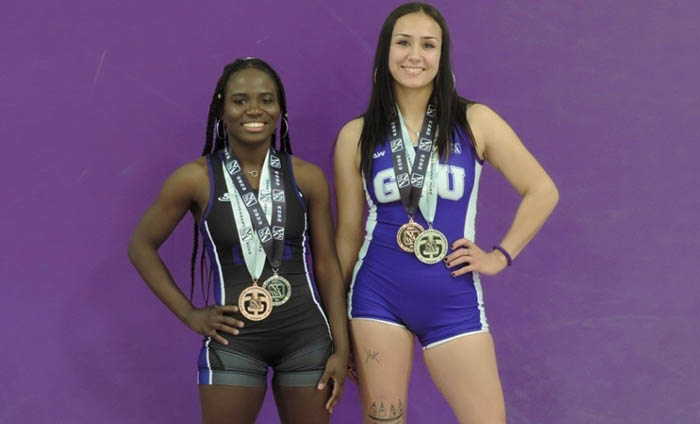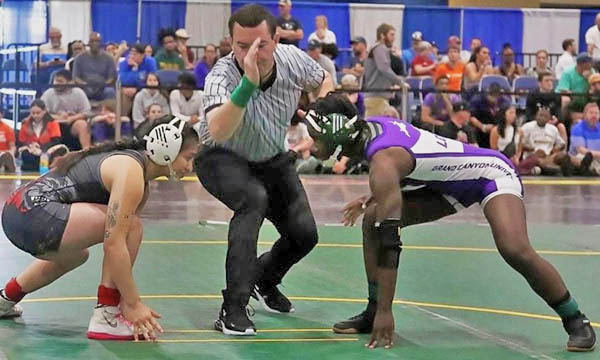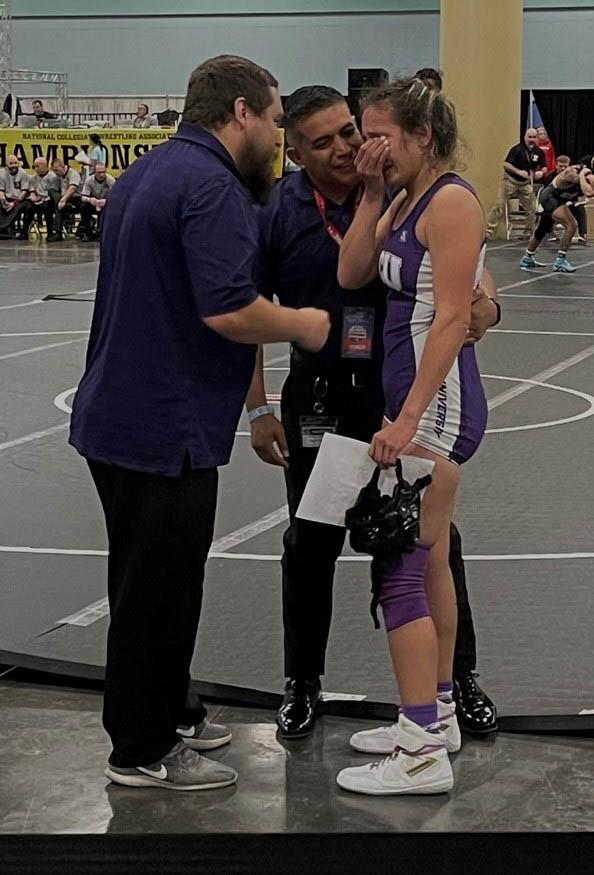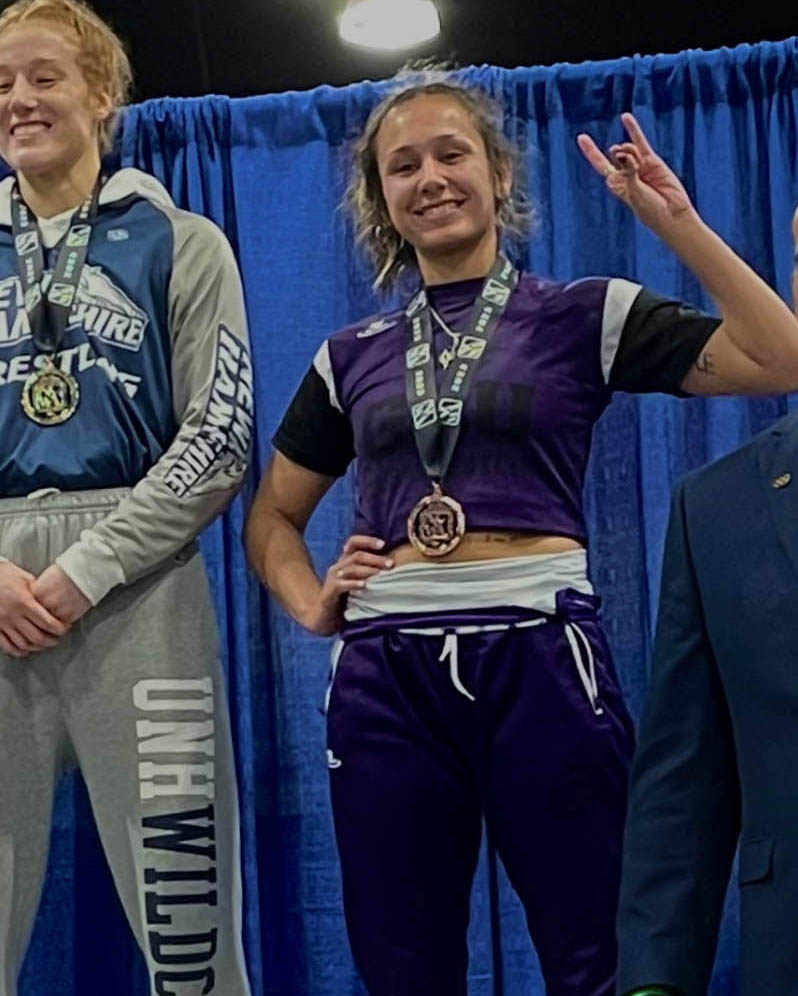
Samantha Tuttle’s arms are crossed, flexing her chiseled arms.
“I’ve always been a trailblazer,” she said with confidence.
As a young wrestler in New Mexico, she used to hear the boys laugh that they were wrestling a girl. Then Tuttle would pin them.
“They definitely cried,” she said. “That was the best part. Their girlfriends wouldn’t talk to them afterward because they just lost to a girl. I miss that.”
Tuttle and teammate Daniela Suttles are trailblazing again, last year helping launch the first Grand Canyon University women’s wrestling team and, this March, placing at the 2023 NWCA National Championships in San Juan, Puerto Rico. Suttles finished second at 109 pounds, and Tuttle third at 136.

Yes, they laugh about the Tuttle and Suttles thing. But if you’ve ever been around wrestlers, it’s best to keep your cracks to yourself. They are very intense.
“I love cutting weight. I love being in shape. I love lifting weights,” Suttles said. “I guess I like punishing myself.”
Not backing down is natural to them. As young girls they had to wrestle boys, but as the sport for women has grown across the U.S., they wrestled against girls in high school and now college. Women’s high school participation eclipsed 20,000 four years ago and has become an NCAA-sanctioned sport at more than 40 colleges. The University of Iowa became the first Power 5 conference team to offer women’s wrestling in 2021, joining a handful of teams in Division I.
Tuttle and Suttles, both juniors, have that goal for GCU — growing participation and interest in the club sport to higher levels to one day become NCAA Division I.
“I was the first girl on the boys team, first on a girls team in high school and first in college,” Tuttle said. “I take pride in it because it makes it easier for the girls coming after me. It’s not easy being the first one, but someone has to do it.”
Both wrestlers overcame a lot this year but were used to overcoming perceptions of women in a combat sport. Tuttle said women add a different level to the sport.
“It’s more fierce and calculated. When guys are wrestling, it’s just like who is stronger,” she said. “We are just built different, so it seems more calculated and articulated and more interesting.”

Coach Chris Esquivel and his assistant and spouse, Sonia Esquivel, have helped the GCU team of four women — including sophomore Carly Courcier, who also competed at nationals — blaze a new path in women’s sport.
“It wasn’t traditional for women to be in combat sports, so when they brought the women’s division in, it quickly grew,” said Chris Esquivel, who wrestled at GCU in 2015.
Because of the success of Tuttle and Suttles and the social media following that Tuttle has garnered across the nation, he expects to triple the size of the team next year.
They both have shown what women can do on the mat, Sonia Esquivel says, in a mental sport that requires mind, body and soul as well as raw strength that helps them in other aspects of life.
“It’s true what she says. As a student athlete we go through so much with school and everything else,” Suttles said. “You have to put all that stuff behind, I am here to wrestle. When we are on the mat, we are not nice to each other, but when we’re not, we are nice.”
Tuttle and Suttles used that mental strength on the mat to overcome issues in their lives.
Suttles was suffering earlier in the year, paying for college by herself, which required that she get a job, while wrestling three hours a day and studying for a pre-law degree. She stressed over her finances and missed her family in Bullhead City because she had no time to see them.
The Esquivels and Tuttle supported and encouraged her, and she kept going, like wrestlers do, earning high grades, working at Taco Bell on campus and excelling on the mat. The discipline she learned in wrestling helped.
“The best moments in wrestling aren’t the winning,” she said. “My dad always talked about good losing. Whether you win or lose it’s going on the mat, take everything you learn from practice, and go out and do your job. If I didn’t win, what did I do wrong? If I win, what could I do better?”
Tuttle, who is a coach for the Westwood High School women’s team in Mesa, had obstacles during the season, too. Westwood coaching tore her away from her own workouts and led to suffering a knee injury just three weeks before the nationals. But she wouldn’t think of missing it.

“I hadn’t practiced until a week before the meet,” she said. “It was a big decision because if I got on my knee I could injure it for a long time. But I was confident in my body because it has kept up with me all these years. I had to trust I could work through it and wrestle on my injured knee. And I did it.”
All the weight cutting, intense workouts and time commitment comes out on the mat.
“It’s what the sport requires,” she said. “Starting at such a young age, it becomes a lifestyle you adopt right from the start. It’s not because you have to do it, it’s because you fall in love with the sport and you will do anything to have success.
“Nothing compares to the thrill of wrestling.”
Chris Esquivel has seen it often with athletes while coaching wrestling on all levels for several years: wrestlers endure through hard times. “What they do is use that discipline they have learned on the mat and apply that to life. They come back for the opportunity to overcome adversity.”
So when Tuttle is asked the moment she likes most in wrestling, pinning an opponent or performing a perfect takedown, her answer may not surprise a wrestler.
“Losing,” she said. “It really shows you can get better. When it comes to wrestling you can lose to anyone. You can beat someone and a week later lose to them. You can always learn, and when you lose you realize you have more to work on, which is exciting for me.”
Grand Canyon University senior writer Mike Kilen can be reached at [email protected] or at 602-639-6764.
***
Related content:



































































